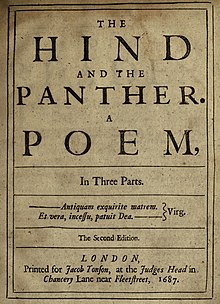John Dryden
| John Dryden | |
|---|---|
| Nascimento | 19 de agosto de 1631 Aldwinkle, Northamptonshire |
| Morte | 12 de maio de 1700 (68 anos) |
| Nacionalidade | |
| Ocupação | Poeta |
John Dryden (Aldwinkle, Northamptonshire, 19 de agosto de 163112 de maio de 1700) foi um poeta, crítico literário e dramaturgo inglês que dominou a vida literária na Inglaterra durante a Restauração.[1]
Vida[editar | editar código-fonte]
Dryden nasceu na aldeia de Aldwincle, próximo Oundle em Northamptonshire. Era o mais velho dos catorze filhos nascidos de Erasmus Dryden e Mary Pickering,[2] Neto paterno de Sir Erasmus Dryden.
Em 1650 Dryden passou para o Trinity College, Cambridge, onde ele teria experimentado um retorno ao ethos religioso e político da sua infância.[3] Chegando em Londres durante o protectorado, Dryden obteve trabalho com o secretário de Estado de Cromwell, John Thurloe.[2] Pouco tempo depois ele publicou seu primeiro poema importante, Heroique Stanzas (1658), uma elegia sobre a morte de Cromwell, que é cauteloso e prudente na sua exibição emocional. Em 1660 Dryden comemorou a Restauração da monarquia e do regresso de Carlos II com Astraea Redux, um autêntico panegírico monárquico. Neste trabalho o interregno é ilustrado como um período de anarquia, e Carlos é visto como o restaurador da paz e da ordem.
Dryden morreu em 1700 e se encontra enterrado na Abadia de Westminster.[4] Sua poesia, patriótica, religiosa e satírico-política, popularizou um tipo de verso hendecassílabo que será o preferido do século XVIII, ao ser tomada como modelo por poetas como Alexander Pope e Samuel Johnson.
Trabalhos selecionados[editar | editar código-fonte]


Trabalhos dramáticos[editar | editar código-fonte]
As datas fornecidas são (atuadas / publicadas) e, a menos que indicado de outra forma, foram retiradas da edição de Scott.[5]
- The Wild Gallant, a Comedy (1663/1669)
- The Rival Ladies, a Tragi-Comedy (1663/1664)
- The Indian Queen, a Tragedy (1664/1665)
- The Indian Emperor, or the Conquest of Mexico by the Spaniards (1665/)
- Secret Love, or the Maiden Queen (1667/)
- Sir Martin Mar-all, or the Feigned Innocence, a Comedy (1667/1668)
- The Tempest, or the Enchanted Island, a Comedy (1667/1670)
- An Evening's Love, or the Mock Astrology, a Comedy (1668/1668)
- Tyrannick Love, or the Royal Martyr, a Tragedy (1668 or 1669/1670)
- Almanzor and Almahide, or the Conquest of Granada by the Spaniards, a Tragedy, Part I & Part II (1669 or 1670/1672)
- Marriage-a-la-Mode, a Comedy (1673/1673)
- The Assignation, or Love in a Nunnery, a Comedy (1672/1673)
- Amboyna; or the Cruelties of the Dutch to the English Merchants, a Tragedy (1673/1673)
- The Mistaken Husband (comedy) (1674/1675)[6]
- The State of Innocence, and Fall of Man, an Opera (/1674)
- Aureng-Zebe, a Tragedy (1676/1676)
- All for Love, or the World Well Lost, a Tragedy (1678/1678)
- Limberham, or the Kind Keeper, a Comedy (/1678)
- Oedipus, a Tragedy (1678 or 1679/1679)
- Troilus and Cressida, or Truth found too late, a Tragedy (/1679)
- The Spanish Friar, or the Double Discovery (1681 or 1682/)
- The Duke of Guise, a Tragedy (1682/1683) com Nathaniel Lee
- Albion and Albanius, an Opera (1685/1685)
- Don Sebastian, a Tragedy (1690/1690)
- Amphitryon, or the Two Sosias, a Comedy (1690/1690)
- King Arthur, or the British Worthy, a Dramatic Opera (1691/1691)
- Cleomenes, the Spartan Hero, a Tragedy (1692/1692)
- Love Triumphant, or Nature will prevail, a Tragedy (1693 or 1694/1693 or 1694)
- The Secular Masque (1700/1700)
Outros trabalhos[editar | editar código-fonte]

- Astraea Redux, 1660
- Annus Mirabilis (poem), 1667
- An Essay of Dramatick Poesie, 1668
- Absalom and Achitophel, 1681
- Mac Flecknoe, 1682
- The Medal, 1682
- Religio Laici, 1682
- To the Memory of Mr. Oldham, 1684
- Threnodia Augustalis, 1685
- The Hind and the Panther, 1687
- A Song for St. Cecilia's Day, 1687
- Britannia Rediviva, 1688
- Epigram on Milton, 1688
- Creator Spirit, by whose aid, 1690.[7]
- The Works of Virgil, 1697
- Alexander's Feast, 1697
- Fables, Ancient and Modern, 1700
- Palamon and Arcite
- The Art of Satire
Referências
- ↑ The Mirror of Literature, Amusement, and Instruction. [S.l.]: J. Limbird. 1839. p. 25
- ↑ a b John Dryden (5 de março de 2013). Selected Poems. [S.l.]: Courier Corporation. pp. 7–8. ISBN 978-0-486-15392-6
- ↑ Samuel Greatheed; Daniel Parken; Theophilus Williams; Josiah Conder, Thomas Price, Jonathan Edwards Ryland, Edwin Paxton Hood (1842). The Eclectic Review. [S.l.: s.n.] p. 47
- ↑ George Lewis SMYTH (1843). Biographical Illustrations of Westminster Abbey. [S.l.: s.n.] p. 78
- ↑ Walter Scott, ed. (1808). The Works of John Dryden. London: William Miller
- ↑ Authorship is unresolved; not included in Scott.
- ↑ Hatfield, Edwin F., ed., The Church Hymn book, 1872 (n. 313, pp. 193–94), New York and Chicago



